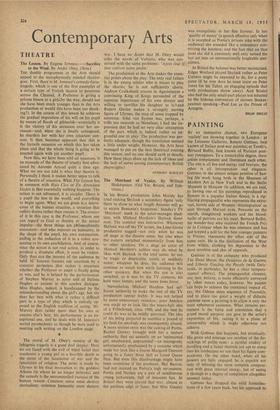IN his Bristol production John Moody has tried making Shylock
a secondary figure 'only there to show to what length Antonio will go to secure Bassanio's happiness.' Sunday's TV 'Merchant' stuck to the actor-manager tradi- tion, with Michael Hordern's Shylock domi- nant. The contrast was instructive. Whenever Shylock was off the TV screen, the Lime Grove production sagged—not only when he was off stage in the theatre sense, but also when the camera switched momentarily from him to other speakers. On a stage an actor of Michael Hordern's calibre may do what he likes with Shylock in the trial scene; he can be tragic or despicable, comic or suddenly noble; whatever he does, the audience will continue to watch him while listening to the other speakers. But when the eye is also switched, as it was by the TV cameras, his hold must loosen, and the scene loses force.
Nevertheless Michael Hordcrn had suf- ficient authority to make the rest of the TV production appear feeble. It was not helped by some unnecessary mistakes : poor Antonio was made up to look like the music-hall idea of a Frenchman, circa 1900, and the best he could do was to be mildly quizzical. The idea of his being prepared to sacrifice a pound of his flesh for anybody was consequently absurd. A more serious error was the &sting of Portia. Rachel Gurney brought with her a mature authority that sat uneasily on an 'unlessoned girl, unschooled, unpractised'—an incongruity unfortunately emphasised by a costume which made her look like a lissom Margaret Dumont , going to a fancy dress ball as Good Queen Bess. But even this disadvantage might have been overcome if the producer, Hal Burton, had not insisted on Portia's high seriousness. Portia and Nerissa are a pair of mischievous young jackanapes, full of innocent fun. At Bristol they were played that way, almost to the perilous edge of farce. But Miss Gurney
was evangelistic in her fine fervour. In her 'quality of mercy' (a speech effective only when it is accepted as Portia's private joke with the audience) she sounded like a missionary con- verting the heathen; and the fact that on that level she did it extremely well only turned the last act into an unintentionally laughable anti- climax.
At Bristol the balance was better maintained. Edgar Wreford played Shylock rather as Peter Ustinov might be expected to do, for a party piece (if he ever does he must insist on Peter Jones for his Tubal, an engaging episode that both productions threw away). And Bristol also had the only small-part player not infected by the hideous convention of current Shakes- pearean speaking—Paul Lee as the Prince of Arr,agon.
BRIAN INOLIS










































 Previous page
Previous page